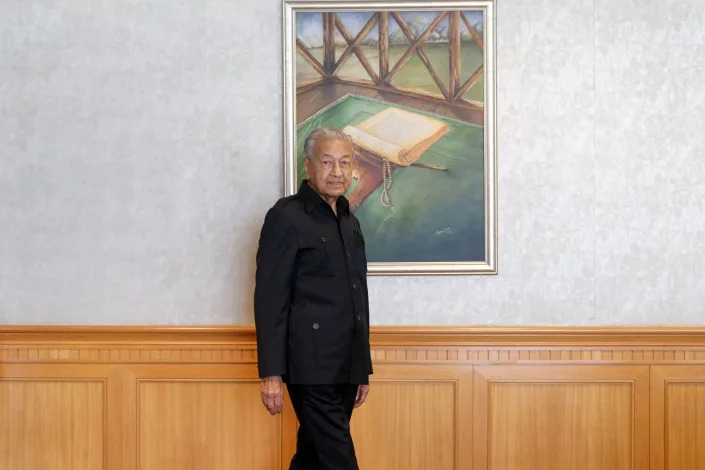Malaysian elections lead to first hung parliament in history

Malaysian opposition leader chairman Anwar Ibrahim (C) with senior leaders in Pakatan Harapan (The Alliance of Hope) react during a press conference after the 15th General Election in Subang, Malaysia, on Sunday. Photo by Fazry Ismail/EPA-EFE
Nov. 21 (UPI) -- Nationwide elections in Malaysia on Sunday, meant to end political gridlock, caused more as none of the country's major parties earned enough votes to form a new government.
The result was the first hung parliament in Malaysia's political history as voters roundly rejected the ruling Barisan National coalition of current Prime Minister Ismail Sabri Yaakob, which grabbed just 30 of the open 220 seats.
The coalition included the once-powerful United Malays National Organization party, which had been in power for decades.
Veteran Malaysian legislator and former Prime Minister Mahathir Mohamad lost his seat after 53 years in office. He had been best known for Malaysia's economic transformation in the 1980s.
With all but one parliamentary seat accounted for, the multi-ethnic Pakatan Harapan coalition, led by veteran opposition leader Anwar Ibrahim, won 82 seats. The Perikatan Nasional party, led by former Prime Minister Muhyiddin Yassin, captured 73 seats.
Perikatan Nasional, or National Alliance, has the support of an Islamic party that is calling for the institution of shariah, or Islamic law, in the country.
"I am confident I will obtain enough support from lawmakers that will enable me to be appointed by the king as prime minister," Muhyiddin said after the election.
As the next step, rival parties must present the name of a candidate they think has majority support in the lower house of parliament.
On Monday, the Barisan National coalition's Supreme Council could not reach a decision on which coalition it would support to form the next federal government.
The coalition's president Datuk Seri Wee Ka Siong said at UMNO's headquarters that negotiations with the leading parties will continue on Tuesday.
"No decision was made at today's supreme council meeting," Wee said.

Malaysian opposition leader chairman Anwar Ibrahim (C) with senior leaders in Pakatan Harapan (The Alliance of Hope) react during a press conference after the 15th General Election in Subang, Malaysia, on Sunday. Photo by Fazry Ismail/EPA-EFE
Nov. 21 (UPI) -- Nationwide elections in Malaysia on Sunday, meant to end political gridlock, caused more as none of the country's major parties earned enough votes to form a new government.
The result was the first hung parliament in Malaysia's political history as voters roundly rejected the ruling Barisan National coalition of current Prime Minister Ismail Sabri Yaakob, which grabbed just 30 of the open 220 seats.
The coalition included the once-powerful United Malays National Organization party, which had been in power for decades.
Veteran Malaysian legislator and former Prime Minister Mahathir Mohamad lost his seat after 53 years in office. He had been best known for Malaysia's economic transformation in the 1980s.
With all but one parliamentary seat accounted for, the multi-ethnic Pakatan Harapan coalition, led by veteran opposition leader Anwar Ibrahim, won 82 seats. The Perikatan Nasional party, led by former Prime Minister Muhyiddin Yassin, captured 73 seats.
Perikatan Nasional, or National Alliance, has the support of an Islamic party that is calling for the institution of shariah, or Islamic law, in the country.
"I am confident I will obtain enough support from lawmakers that will enable me to be appointed by the king as prime minister," Muhyiddin said after the election.
As the next step, rival parties must present the name of a candidate they think has majority support in the lower house of parliament.
On Monday, the Barisan National coalition's Supreme Council could not reach a decision on which coalition it would support to form the next federal government.
The coalition's president Datuk Seri Wee Ka Siong said at UMNO's headquarters that negotiations with the leading parties will continue on Tuesday.
"No decision was made at today's supreme council meeting," Wee said.
Mahathir’s Shock Election Loss Marks End of Decades-Long Career


Anisah Shukry
Sun, November 20, 2022
(Bloomberg) -- At 97, Mahathir Mohamad was looking to the future, plotting to form a government once again after Malaysia’s national vote. Instead, the country’s longest-serving leader finds himself dumped out of parliament in what’s likely to be the end of his storied political career.
It’s a stunning fall from grace for the man who, just four years ago, led a reformist coalition to victory at the general election. The defeat shows that even the elder statesman of Malaysian politics wasn’t safe from voters angered about the country’s political instability.
Best known for ousting the party he once led and then zeroing in on the multibillion dollar 1MDB scandal that saw ex-leader Najib Razak jailed, Mahathir lost traction this time with young, first-time voters worried about jobs and rising living costs.
Going into the election, Mahathir had positioned his fledgling party as an alternative to the three main coalitions contesting in the election. “Pejuang’s promise is to form a government that is free from corruption and thievery of government funds,” said Mahathir a day before the vote. “Choose Pejuang if you want to prevent the country from falling into chaos and disaster.”
How Malaysia’s 1MDB Scandal Shook the Financial World: QuickTake
Pejuang didn’t win a single seat of the 125 it contested. Mahathir, who was defending his Langkawi seat in a five-way contest in his home state of Kedah in northern Malaysia, secured just 10% of the votes and subsequently lost his election deposit.
He has yet to make a statement on Saturday’s showing. A spokesperson said Mahathir hasn’t indicated he would issue any comments.
Rise to Power
Mahathir’s political career began in 1964, and his rise to power was marked by a push for policies favoring Malays and other indigenous people who make up the majority of Malaysia’s 33 million people.
Propelled by an ambition to turn Malaysia into a developed country, Mahathir set up a state-owned carmaker, Proton, in 1983. Granted tax breaks to allow for lower sticker prices, the company began assembling so-called national cars powered by Mitsubishi Corp. engines but it faltered over the years and China’s Zhejiang Geely Holding Group bought a 49.9% stake in 2017.
He also helped put Malaysia on the world map, through ambitious construction projects such as the world’s tallest office building, the world’s longest building, one of the world’s largest dams and Southeast Asia’s largest airport. He introduced the “Look East Policy” to push Malaysia to emulate the economic performance and work culture of countries in the region, particularly Japan, as a way to move away from the West.
To be sure, Mahathir’s first stint as prime minister was not without controversy. During the height of the Asian financial crisis, the ringgit plummeted 35%, reserves dwindled and the stock market crashed and lost half its value. Repeatedly accused of being anti-Semitic, Mahathir said he suspected a Jewish “agenda” to be behind the drop in the value of the currency.
To address the crisis, Mahathir ignored advisors including his own deputy and finance minister at the time, Anwar Ibrahim, and rejected an IMF bailout in favor of imposing a currency peg and capital controls.
Mahathir also made short work of his No. 2, sacking Anwar from the cabinet within a week after unveiling his currency controls. Anwar was swiftly arrested on sodomy charges, prompting his supporters to hold the biggest anti-government rally since Mahathir took office 17 years earlier.
He shrugged off international criticism for his “authoritarian” ways and secured his fifth term as prime minister in a national vote held a year later, buoyed by a stronger economy that helped sway ethnic Chinese voters to his side.
King Maker
Mahathir stepped down in 2003 at 78 “to deflect the growing pressures from party members” who wanted him to serve for life, he said in 2002. But he kept his hand in politics by criticizing his successor, Abdullah Ahmad Badawi, for scrapping pet projects such as Malaysia’s half of a bridge to Singapore.
Mahathir suggested that Najib Razak, who would later be sent to prison for his role in the 1MDB corruption scandal, should take Abdullah’s place. Yet shortly after Najib took office in 2009, Mahathir turned on him as well, citing worsening race relations and a tougher business environment. The attacks continued for years, especially as the 1MDB scandal grew.
In 2016 Mahathir quit Barisan Nasional, the coalition that had ruled Malaysia for more than 60 years, to join the opposition. For the 2018 election he offered himself as a prime minister candidate for a four-party opposition coalition while Anwar, the de-facto leader, sat in jail, promising to eventually step aside and let him take the post if they won. The gambit paid off when they scored a upset victory, ending BN’s more than six-decade reign.
Mahathir’s return was dominated by his fight against corruption. He focused on the multibillion dollar 1MDB scandal and the role Najib played in siphoning off about half the $8 billion the fund raised in bond sales.
But Mahathir’s popularity waned as he failed to deliver on promises such as abolishing road tolls and reducing living costs. His approval rating plunged to 37% from a high of 83%. As tensions with Anwar rose over the timing of the succession, Mahathir abruptly quit in 2020 and sought to strengthen his hand by forming a unity government outside party politics. It backfired.
The king ultimately appointed Mahathir’s right-hand man, Muhyiddin Yassin, as prime minister, paving the way for the coalition that Najib once led to return to power. Relegated to the opposition once again and feeling betrayed, Mahathir formed Pejuang to try to unseat him, while insisting he didn’t want to be prime minister again.
“Mahathir still retains a residual degree of influence among the Malays,” said Oh Ei Sun, a senior fellow at Singapore Institute of International Affairs. “Left on his own without a robust party machinery, his political aura could not be magnified sufficiently to win him significant electoral gains.”
Pejuang was trounced by the old ruling coalition during its by-election debut in 2020. It fared disastrously as well in the Johor state election in March, failing to win any of the 42 seats it contested.
That was a foreshadow of Saturday’s humiliating defeat.
No comments:
Post a Comment